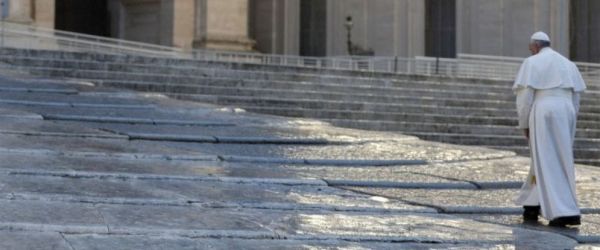In the Gospel of today’s Liturgy, Jesus gives some basic life guidance to the disciples. The Lord refers to the most difficult situations, those that constitute the bench test for us, those that confront us with those who are enemies and hostile to us, those who are always trying to do us harm. In such cases, the disciple of Jesus is called not to give in to instinct and hatred, but to go further, much further. To go beyond instinct, to go beyond hatred. Jesus says: “Love your enemies, do good to those who hate you” (Lk 6:27). And even more concretely: “To him who strikes you on the cheek, offer the other also” (v. 29). When we hear this, it seems that the Lord is asking for the impossible. And then, why love your enemies? If one does not react to bullies, then every abuse of power is given free rein, and this is not fair. But is it really so? Does the Lord really ask for the impossible and indeed even unjust things of us? Is it so?
Let us consider first and foremost that sense of injustice that we feel in “turning the other cheek”. And let us think of Jesus. During the passion, in his unjust trial before the high priest, at one point he receives a slap from one of the guards. And how does He react? He does not insult him, no: he says to the guard, “If I have spoken wrongly, bear witness to the wrong; but if I have spoken rightly, why do you strike me?” (Jn 18:23). He asks for an account of the wrong done to him. Turning the other cheek does not mean suffering in silence, giving in to injustice. With his question, Jesus denounces what is unjust. But he does so without anger, without violence, indeed with kindness . He does not wish to spark off an argument, but rather to defuse resentment , this is important: to extinguish hatred and injustice together, seeking to restore the guilty brother. This is not easy, but Jesus did it and he tells us to do likewise. This is turning the other cheek: Jesus’ meekness is a stronger response than the slap he received. Turning the other cheek is not the withdrawal of the loser, but the action of one who has a greater inner strength. Turning the other cheek means defeating evil with goodness which opens up a breach in the heart of the enemy, unmasking the absurdity of his hatred. And this attitude, this turning the other cheek, is dictated not by calculation or by hatred, but by love. Dear brothers and sisters, it is the freely given, undeserved love we receive from Jesus that generates in the heart a way of doing things that is similar to his, that rejects all vengeance. We are accustomed to revenge: “You did this to me, I will do that to you”, or to bearing a grudge in our heart, resentment that harms, that destroys the person.
Let’s get to another objection: is it possible for a person to come to love his or her enemies? If it depended only on us, it would be impossible. But let us recall that, when the Lord asks for something, he wishes to give it. The Lord never asks for something he has not already given us first. When he tells me to love my enemies, he wants to give me the capacity to do so. Without that ability, we would not be able, but he tells you to “love your enemy” and gives you the capacity to love. Saint Augustine prayed in this way — listen to this beautiful prayer: Lord, “give what You command, and command what You will” (Confessions , X, 29.40), because you have already given it to me. What should we ask of him? What is God happy to give us? The strength to love, which is not a thing, but rather the Holy Spirit. The strength to love is the Holy Spirit, and with the Spirit of Jesus, we can respond to evil with good, we can love those who do us harm. This is what Christians do. How sad it is when persons and peoples who are proud to be Christians see others as enemies and think about waging war against each other! It is very sad.
And we, do we try to live following Jesus’ invitations? Let us think about someone who has wronged us. Each one of you, think of a person. It is common for us to be hurt by someone; think of that person. Perhaps there is some resentment within. So, let us set the image of Jesus alongside this resentment: meek during his trial, after the slap. And then let us ask the Holy Spirit to act in our heart. Finally, let us pray for that person: praying for those who have done us harm (cf. Lk 6:28). When someone has wronged us, we immediately go and tell others and we feel we are victims. Let us stop, and pray to the Lord for that person, that he might help him or her, and so this feeling of resentment will be dispelled. Praying for those who have wronged us is the first step to transforming evil into good. Prayer. May the Virgin Mary help us be workers of peace towards everyone, especially those who are hostile to us and whom we do not like.
[Pope Francis, Angelus 20 February 2022]












